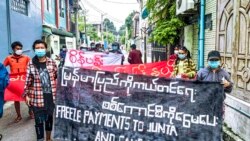Rights groups say Myanmar’s junta is tightening its chokehold on humanitarian aid flows to thousands of families driven from their homes by fighting since a Feb. 1 coup, deliberately starving civilians of lifesaving supplies to try to crush a growing armed resistance.
The United Nations says fighting between the military and a patchwork of old and new armed groups is pushing more families out of towns and villages every month, with more than 284,000 people displaced by the post-coup violence as of early December.
Most of them are in Myanmar’s rugged and remote northwest and southeast, where armed resistance from ethnic minority armies and so-called people’s defense forces has been fiercest.
Local and international charities and aid groups are trying to reach families with food and medicine to stave off a wave of disease and starvation. But rights groups say soldiers and police are making it increasingly difficult by blocking routes, seizing and destroying supplies and arresting aid workers.
“What we’re seeing right now is the military, in its efforts to cut off supplies going to the ethnic armed forces and the people’s defense forces that they are in conflict with right now, they are also cutting off vital supplies to the people. And these are the ordinary things, the basic necessities,” Emerlynne Gil, deputy regional research director for Amnesty International, told VOA.
Amnesty released a brief report on the aid restrictions Friday, drawing on interviews with displaced families and local aid workers and volunteers.
In its own update on the humanitarian situation in Myanmar last week, the U.N. said delayed and denied travel approvals from authorities and increased scrutiny of aid supplies and staff were “hindering operations and prolonging suffering.”
Other local and international rights groups corroborated the trend.
“A lot of these areas where the junta has increased its presence are facing an increased militarization, so more checkpoints, which means that aid workers and other local responders in those areas are facing more harassment. Aid workers are being arrested and detained, aid convoys are being turned back, supplies are being confiscated,” said Shayna Bauchner, Asia researcher for Human Rights Watch.
“For the most part, all of these were tools that were certainly used pre-coup,” she added. “But they’ve sort of been … turned up to a new level both since the coup and then also more in recent months.”
Rights groups say that in blocking the aid the Myanmar military is drawing on its notorious “four cuts” playbook for denying armed rebel groups access to food, funds, intelligence and new recruits by cutting off surrounding communities that might sympathize with and support them.
Bauchner said that makes civilians not only collateral damage but deliberate targets.
“Whether they [junta leaders] use the term four cuts or not, this is obviously an effort to essentially punish civilians. I think it’s a very clear measure of the junta’s hostility toward the people of Myanmar, this way that it’s weaponizing lifesaving aid,” she said.
Some of the heaviest fighting has been taking place in the western states of Chin and Sagaing, along Myanmar’s border with India. The U.N. says clashes there have displaced more than 80,000 people since the coup.
Salai Za Uk Ling, deputy director of the Chin Human Rights Organization, said security forces have all but cut off parts of Chin state over the past few months, making aid deliveries from inside Myanmar practically impossible.
He said authorities have allowed the U.N. to ship aid to a few main towns but have refused to let staff travel into the surrounding hills, where they need to go to reach the families that have fled their homes. Local charities pleading with authorities for access to the families have had no luck, he added, and those trying to reach them with aid by skirting checkpoints have been arrested when caught or have gone missing.
“This is intended to obviously starve the people and incapacitate the communities so that … they won’t be able to support the resistance,” Salai Za Uk Ling said. “They are trying to impose a blanket policy affecting all the inhabitants of the area.”
Desperate to help, his team has in the past few weeks started reaching displaced families sheltering near the Indian border with rice, lentils and cooking oil the only way they can — by smuggling them in from India.
But he said their efforts were “just a drop in the ocean” and that some of those displaced by the fighting have already died because they could not risk a trip to the nearest hospital or clinic and because security forces won’t let food and medicine get to them.
“In terms of medical care, there’s no hospitals or anything that they can access, so many elderly people have died,” he said, “People died unnecessarily and from various kinds of treatable disease.”
Gil, of Amnesty International, warned that the death toll will rise if the junta’s stranglehold on aid does not let up.
“More and more people will die, not just because of hunger, but also because of the inability to access vital services, reproductive health care, really just the basics, the things that people who are outside Myanmar would take for granted,” she said.
A spokesperson for the junta could not be reached for comment.





